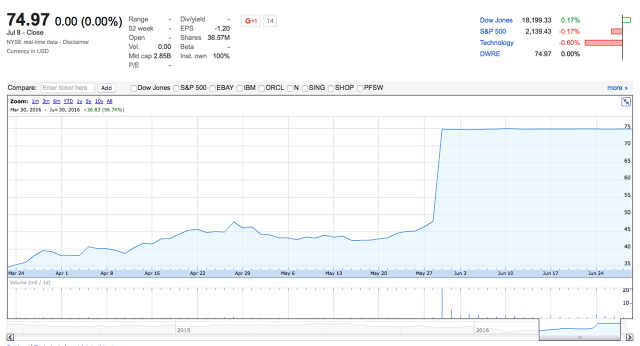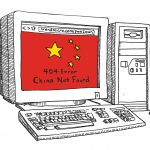Secrets Of Silicon Valley Intrigue Revealed In Colin Powell’s Hacked Emails
The recent hacking of Colin Powell’s email accounts prompted juicy headlines about the former Secretary of State’s dislike of Donald Trump and withering criticism of Hillary and Bill Clinton.
But it has also revealed plenty of inside details and gossip about drama in Silicon Valley through correspondence related to Powell’s role as a board member of Salesforce.com and as a strategic adviser to one of the tech world’s most powerful venture capital firms, Kleiner, Perkins, Caufield and Byers. And it provided unprecedented insight into the revolving door between government and industry—complete with its perks, insider deals, and extraordinary access.
When he left the Bush Administration in 2005 after serving as the first African-American secretary of state, Powell was perfectly positioned to take advantage of his new life in the private sector. A decorated military hero and politically moderate and well-respected official, he managed to avoid the bulk of the blame for the Iraq War. Just six months after resigning in January 2005, he joined one of Silicon Valley’s most powerful venture capital firms, Kleiner Perkins, as a strategic limited partner. Two years later, he joined the board of directors of AOL cofounder Steve Case’s new company, Revolution Health, and in 2014, he joined the board of buddy Marc Benioff’s Salesforce.
Throughout the 11 years he’s been in the private sector, he’s straddled the worlds of government and technology, advising future administrations on military issues and consulting with top venture capitalists on what high-tech startups to invest in. His Gmail account from 2014 to August 2016 is full of correspondence with top investors, leading politicians and government officials, and former military colleagues. Among the most revealing moments are Powell’s efforts to avoid running into Hillary Clinton at a fundraiser thrown for her by Salesforce CEO Marc Benioff, an internal study in which some Salesforce employees complained about gender bias at the company, Powell’s efforts to get Kleiner Perkins to improve its diversity in the wake of the Ellen Pao lawsuit, and Powell’s strenuous efforts to get AOL cofounder Steve Case into one of world’s most exclusive and powerful social clubs.
How To Avoid Hillary Clinton
Just six days after Hillary Clinton’s use of a personal email server was first revealed in a story on the front page of the New York Times on March 2, 2015, Benioff invited Powell to a small dinner he was hosting at his home for Clinton. He excitedly told Powell, “I’m sure she would be thrilled to say hello to you!” Benioff intended to raise about $500,000 for the Clinton Foundation, which he thinks “does very good work in the world.” Powell immediately forwarded the invite to his personal assistant with a laughing emoji.
Powell’s response to Benioff was blunt: “We can shake hands if we pass each other, but no real need. Don’t want to generate another ’emailgate’ story and don’t want to be at a Foundation fundraiser. Don’t push to make it happen.” He also explained that though he and Hillary “are very close and have been for years,” he is annoyed at her team for linking his private email use with her situation. He also snapped that Hillary “once said she voted for the 2003 war because of my U.N. speech. I had to remind her that she voted for it three months before my speech. :)”
In between, Powell was hurriedly emailing his assistant, who replied: “Good lord. She’s the last person you need to see right now.” The assistant suggested that Powell leave Benioff’s house right before Hillary’s arrival, claiming that he needed to catch his flight home, even though it didn’t leave for another three hours. She tells him, “But that still has you waiting at the airport for a few hours.” Powell doesn’t mind, seeming to prefer waiting at an airport to talking to Clinton: “I usually wait a while.” He adds, “I’ve told Marc most might be a hello on the way out if she is on time. I doubt she’d want me around as she tries to hustle Marc, nor would I want to be.” It’s not clear if Powell ever stayed around to meet Clinton at the dinner.
Bromance With Benioff
Multiple emails show Powell and Benioff’s touching bromance—often emailing each other with the most casual observations, sharing stories about their newest sports cars, and always signing off with “Aloha.” As a board member, Powell was obviously privy to some of the most intimate dealings of the giant company, including letters from regulators, potential acquisitions, and the status of litigation. Among the revelations is that Salesforce considered acquiring Adobe and business-automation software giant Pegasystems, among 12 other companies (with the notable exception of Twitter, which Salesforce considered buying in recent weeks before stepping back) listed on a 60-slide presentation sent to board members back in May 2016, as reported by the Wall Street Journal.
When Salesforce lost its bid to acquire LinkedIn due to Microsoft’s higher offer, Benioff emailed Powell that maybe the company wasn’t prepared for the intensity of that competition: “We were closer than we realized—maybe a $105 cash plus $105 stock would have done it! But we were definitely over our skis!!!!”
Women Complain About “Boys’ Clubs” At Salesforce
Among the documents shared with Powell was a “Salesforce Culture Retention Study,” which the company commissioned to learn more about why employees choose to stay or leave Salesforce. Many of the 73 current and former employees interviewed had positive responses, citing the alignment between their own personal values and the company culture, and often praising Benioff for his generosity and his reputation for taking a stand on social issues. “It’s nice to be working for a CEO that stands up, vocally, for a lot of the things I personally believe in,” said one employee. “Like the philanthropic model—I’ve never had that; I think that’s pretty amazing. I don’t know why I would leave, you know? I’m excited to be here.”
Other current employees raved about the opportunities to grow at the company: “Oh, the ability to grow and change in my responsibilities and roles, yeah. That’s exactly—that’s exactly why I see myself staying.”
But there were also descriptions of some women who had “extremely negative experiences” that they attributed to gender bias at Salesforce. They cited the “boys’ clubs” and “extremely misogynistic nature” of Salesforce as a significant barrier to career advancement. Other women cited “derogatory labels” used at the company, and one woman recalled being told that “women don’t belong in the tech industry.” The report noted that since Salesforce was considered a leader in equal pay and treatment, “these discrepant experiences were alarming.” The authors noted that they lacked “sufficient data to fully understand the dynamics” surrounding these topics and called for further discussion.
Other employees reported a torturous workplace where they were under pressure to “antagonize customers,” resulting in a “churn and burn” feeling and a dynamic of “do your fucking job.” And some employees reported incessant cursing, “table pounding,” and condescending micromanagement in which you were “made to feel stupid.”
Reached for comment, Salesforce’s EVP for Global Employee Success, Cindy Robbins, emailed the following statement to Fast Company:
There is no finish line to equality and fostering a culture of trust, transparency, and wellbeing. Salesforce continues to be one of the best places to work because we continuously solicit feedback from our employees. We routinely commission third-party studies to evaluate key areas of our culture, and we shared the findings of this report in a webcast to our entire workforce as part of our commitment to transparency and to spark meaningful dialogue around areas for improvement.
Regulatory Inquiries About Trading Activity
Other emails discuss regulatory concerns about elevated trading activity in advance of Salesforce’s $2.8 billion acquisition of e-commerce service provider Demandware on June 1, 2016, which was the subject of an inquiry by Wall Street regulator the Financial Industry Regulatory Authority (FINRA). Upon the announcement of the deal, shares of Demandware, which went public in 2012, shot up 55% on that day. The agreement to buy Demandware was for an offer of all its shares at $75 a share, a 56% premium to its closing price on May 31. Thus, investors who bought the stock in the days before the acquisition could have made a lot of money. And FINRA seems to suspect that there were more than a few of those savvy investors.

In an email to Powell, Salesforce’s general counsel passed along a list sent to the company by FINRA of about 100 individuals and groups, from a Moscow-based investor to prominent Wall Street firms like Renaissance Technologies and Elliot Capital Management. In the email to Powell, the counsel wrote:
Please review the highly confidential attached list of individuals and entities. If you know or have a relationship with any of the persons or entities on the list, please contact me immediately so I can make arrangements to follow up with you for additional information. It is critical that you do not contact anyone on the attached list yourself. If you do not know or have a relationship with any person or entity listed, please reply to this email confirming “NONE” by Friday, July 29th.
Powell replied that he did not. In a similar letter sent to Powell regarding trading activity in 2015, he explained that he did know one of the people who had traded in Salesforce stock, but that he hadn’t communicated with him in recent years.
Such inquiries by the regulator are fairly routine in the wake of major mergers and acquisitions. FINRA has the ability to fine companies and individuals for insider trading violations, though it emphasized in both letters to Salesforce that the inquiries should not necessarily be “construed as an indication” that the agency has determined that any FINRA rules or federal securities laws have been violated. A spokesperson for FINRA declined to comment about the inquiry when contacted by Fast Company.
The emails also reveal some of top investors’ strategies and regrets when it comes to the tech sector. One of Powell’s friends is David Rubenstein, the billionaire investor who cofounded the Carlyle Group. In their correspondence, when Powell mentions his board membership with Salesforce, Rubenstein reveals his regret that he didn’t invest earlier in Salesforce, saying that they looked at it “in the venture stage and stupidly passed on the investment. One of many mistakes.”
Dinner Plans With Zuck
Though Powell was inundated with invitations to events, conferences, and private dinners, he turned down most of them, except when Mark Zuckerberg came calling. Powell was extremely eager to have a private dinner with the Facebook CEO and his wife, Priscilla Chan, and Facebook COO Sheryl Sandberg at Zuckerberg’s home. When Zuckerberg’s assistant reached out to Powell because “Mark is interested in meeting and spending time with interesting people that he can learn from,” Powell eagerly responded. After numerous emails back and forth, Powell gets frustrated with the response that it won’t happen due to a Sandberg scheduling conflict: “I didn’t know she was essential to this dinner,” he wrote in an email to his assistant.
“Email Does Scare Me”
One of the most ironic aspects of the email trove is that dozens of hacked emails discuss email security, with Powell emphasizing the measures he’s taken to improve such security. In an email to Shane Harris at the Daily Beast, Powell’s assistant noted:
General Powell was hacked by [Romanian hacker] Guccifer, along with numerous other political and celebrity figures a few years ago. At that time, he immediately took appropriate measures to protect that account which had been inactive for several years. As you know, Guccifer was arrested by the Romanian authorities and is now in jail. To the best of our knowledge, that was the only compromise of that account. As regards to your second question, see the statement we provided a few days ago. The only thing that I would add is that he did have a State Department computer.
Soon after reports that Clinton’s private email server was hacked in July 2015, Powell reached out to an investment adviser who cautioned him: “Email does scare me because people seem to get their hands on things. Happy to discuss alternative ways of communication if need be.”
And on October 20 2015, just days after CIA Director John Brennan’s AOL email account was hacked, Salesforce’s Benioff reached out to Powell, saying, “I hope you have shut down your old AOL account.” Powell responded, “Years ago. On gmail with multiple screens.”
Post-Pao, Powell Pushes For More Diversity At Kleiner Perkins
As a strategic adviser to Kleiner Perkins, Powell was in regular contact with chairman and Silicon Valley investing legend John Doerr to express his support while the firm defended itself from a headline-making gender discrimination lawsuit filed by former junior partner Ellen Pao.
When Pao lost her case, Powell congratulated Doerr but strongly recommended that the firm do more to increase racial diversity, too. In a July 2015 email after the verdict, he told Doerr: “Next time I see you I’d like to discuss racial diversity and not just gender and ethnicity.” To which Doerr responded: “Yes, the tech industry and we have a long way to go wrt to diversity. But we’ll do better, and more.” And KP General Partner Beth Seidenberg responded: “We are focused on both gender and ethnicity, and when you are in town next we would love to get your input. Our goal for our Fellows program is that in 2016 we will have a class that includes 50% women + underrepresented minorities. We are expanding our outreach to make sure that we accomplish this.”
In the email, Doerr told Powell: “As a father of two daughters, this is personal. I am committed to help get to a 50/50 world, one with opportunity for them and everyone. This is important for social justice, and because it is better for business. And because diversity is a core value at Kleiner, a partnership I love and am proud of.”
Powell and his aides were well aware of a culture clash with Silicon Valley, especially when the retired general visited the firm’s offices on Sand Hill Road in Menlo Park. When Doerr’s assistant kept calling Powell by his first name, Powell’s aide was infuriated: “I know CA and Silicon Valley is [sic] laid back, but it’s just so unprofessional and says something about her and her judgment. So whenever you pass her desk out there, you had BETTER refer to yourself as General Powell around her!”
That December, Powell got KP’s annual Christmas card, which included the following greeting:
In 2015, we all got more familiar,
Up close and personal, nearly familial
With design sessions, reports, leadership salons,
Meetups, workshops, cheese plates and prawns.
We hope you benefited with an idea or two,
Fresh motivation, met someone new.
The network may be the computer, in tech,
But in life, your network makes intros and clears bottlenecks.
At your brilliance and accomplishments, we couldn’t be humbler,
And so you expanded our proverbial Dunbar number.
2015 was an absolute accelerator:
NASDAQ stayed high, and the Valley didn’t crater.
May your 2016 be even that much greater.
And we hope we get to work with you all, sooner or later!
The emails also show the enormous sums given by KP to its partners and advisers. On May 1, 2015, Powell received a notice that he would receive a share of the $240 million that KP was distributing as a result of Bristol-Myers Squibb Company’s acquisition of Flexus Biosciences. And in March 2016, he received another notice about his portion of 446,075 shares of common stock of Aerohive Networks, which had doubled in value since being purchased in 2010.
Does Amazon Have A Heart And Soul?
Not all of Powell’s former diplomatic and military colleagues were impressed with the values and mores of Silicon Valley’s biggest heavyweights. In one email, longtime friend Marybel Batjer, who now runs California’s state operations agency, emails Powell her strong displeasure with Amazon’s work culture in the wake of a tough New York Times story about the company in August 2015:
I do not “dig” this easy acceptance of Amazon’s culture just bc/ they are transparent about it and state clearly to everyone “if you don’t like it, don’t come work here!”
The behaviors “they teach” and the human interactions that are cruel that they condone, if not celebrate stay with individuals far beyond Amazon. I don’t care to be in a community that acts and reacts to such prescribed competition and material gain at the expense of heart and soul—care for fellow-person!
I’m sorry there is such general acceptance of Bezo[s] and Amazon, especially in Silicon Valley. I guess I should not be surprised.
And despite years of investments in technology companies, Powell was often skeptical of the hype surrounding innovation. In one August 2015 email to a friend, he expressed his displeasure that the Pentagon, under Secretary of Defense Ashton Carter, seemed to be enraptured with new gadgets while troop levels get cut:
As I used to say to the Chiefs as the Cold War was ending, “What will all the preachers do now that the devil has been saved.” We focused on capabilities for possibilities, and not singularly on threats. But the Pentagon machine has no fuel but threats. And there is no oversight; not in OSD, OMB, WH, or Congress. Ash is creating another organization of Silicon techies to develop sensors to sew into troops uniforms and similar electronic RMA. They will get $75m. I hope there will be troops left to wear the stuff.
Not Impressed With “The latest White Black Celebrity”
Powell has a reputation as a reserved and sober personality, but in private emails he displays a sharp wit and plenty of snark. Once when he and New York Times columnist Maureen Dowd discussed a column by her colleague David Brooks, she quipped that Brooks “keeps writing about hotels because he’s having sex again after 25 years.” To which, Powell replied, “Umm, God, I am so tempted, but I will not touch that line.”
When a friend asks Powell for his opinion of Atlantic writer Ta-Nehisi Coates, Powell replies, “He is the new senior black intellectual replacing Skip Gates, Cornell West, et al. The kind Aspenites love,” referencing the upper-class elite who vacation at the Colorado ski resort town. Later, he adds: “Sounds like the latest White Black celebrity. 🙂 Seriously, I will read some of his stuff. I tell kids to stop the whining, blaming white folks and wanting reparations.”
The emails also reveal how the chummy network of investors would pass along tips and ideas, most of which were not available to the average day trader. Powell would often pass along investment ideas suggested by old acquaintances and colleagues. When the son of former Canadian prime minister Brian Mulroney forwarded him info on 3D hologram technology, Powell sent it to his colleagues at Kleiner Perkins: “I thought you would find this technology interesting.”
Investment opportunities often fell into Powell’s lap through his extensive network of contacts. In a group email to Powell and fellow board members of an energy company, he was invited to join a new VC fund started by former 49ers quarterback Joe Montana and advised by Y Combinator’s Paul Graham.
Getting Case Into The World’s Most Exclusive Club
One of the perks of his post-government life was membership in the super-secret Bohemian Club, a group of the world’s most rich and powerful men who attend the infamous Bohemian Grove every year at a campground in California to drink, talk, and worship the redwoods, among other rituals. Powell tried several times to get his buddy, former AOL founder Steve Case, into the club, but to no avail.
At one point, the club’s Bob Cohn informs him of the latest rejection of Case: “For the last two years, you were kind enough to write a letter supporting Steve Case for preferential admission to the Bohemian Club. Unfortunately, the Committee did not approve his application last year (technically the application was withdrawn at their suggestion). I’ll be happy to explain the reasons he didn’t make it last year on the phone with you—I’d rather not write them. Steve took it all very well and has been a champ at continuing the process (I probably would have told the Club to stuff it).”
That exchange—and other emails about vacations in Aspen and private Council on Foreign Relations dinners—seem to confirm every conspiracy theory told by both left-wing and right-wing populists: That a secretive cabal of the world’s most powerful men runs the world, while maintaining the pretense of democracy, just as they’ve been doing for centuries. And that despite slightly more gender and racial diversity, that elite club still pulls the levers—it’s just that the center of power has shifted to Silicon Valley. Powell may sometimes look down on the tech world’s priorities and peculiarities, but he can’t help being drawn to its energy and vitality and luxurious perks.
Related Video: Inside The Secret World Of Code-To-Code Combat
Fast Company , Read Full Story
(55)












